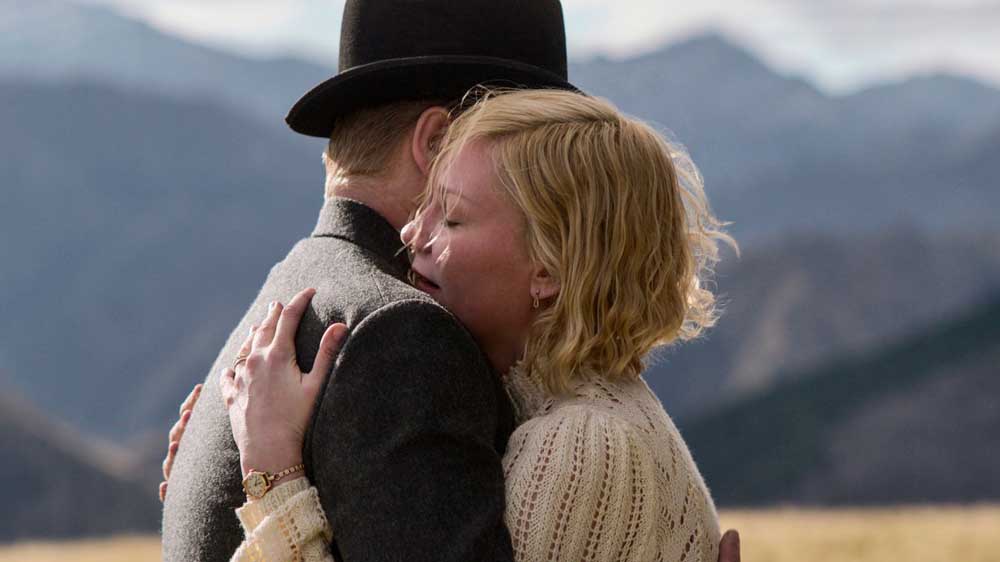Movie review: ‘The Power of the Dog’
Published 3:45 pm Thursday, December 9, 2021

- Kirsten Dunst and Jesse Plemons in a scene from “The Power of the Dog” (2021).
Director Jane Campion is no stranger to beautifully made dramas, and she delivers again in the gut-punching Western “The Power of the Dog.” Fans of the genre may be let down by the lack of standard themes of the Western, namely fisticuffs or gun fights. Instead, the turmoil is left brewing below the surface — out of sight, if you’re not paying attention — eventually boiling over in a brilliant ending.
Campion adapted the film from the 1967 Thomas Savage novel of the same name, both using the psychology of the characters to drive the action rather than a typical storyline in which bad guys roll into town and cause a ruckus, leading the good guys to valiantly save the day. There is much more to it than that.
Set in 1928 on a rural Montana ranch run by brothers Phil and George Burbank (Benedict Cumberbatch and Jesse Plemons, respectively), the film utilizes the overall idea of masculinity as the prominent threat of the plot.
Phil is a pale-eyed, grizzled and typically grimy cowboy. He wears his spurs in the house, refuses to use the indoor bath to clean off the dirt from the range and is obsessively cruel towards others he feels are softer than he is, including his brother.
George on the other hand is kinder and more softspoken. Because of that, he lacks the same kind of respect around the ranch hands that Phil easily commands.
When they drive their herd of cattle into the small town of Beech one day, they encounter a window, Rose (Kirsten Dunst), and her son, Peter (Kodi Smit-McPhee), working in the small restaurant. Peter is skinny as a rail, speaks with a slight lisp and has gone to the trouble to make paper flowers to dress up the dining room.
Phil immediately reacts to him, calling him names dripping with resentment, much to the delight of the other cowboys at the table.
George, however, is almost oblivious to this and is instead smitten with Rose. He continues going into town just to see her, much to the displeasure of Phil, and eventually marries her.
With Peter at school, Rose moves to the big ranch house and must contend with Phil’s slow and almost calculating torments, driving her to drink. When Peter comes home for the summer, her nerves only get worse, and so, too, does Phil’s reaction to both her and Peter.
As time progresses, it becomes clearer that Phil’s reactions are caused by his own self-loathing and repressions, revealed carefully throughout the film. By using this overarching cruelty as his defense mechanism, he can hide his true self in the dark, allowing it to show only in small moments of solitude.
Every performance is superb, with only one slight detraction given Cumberbatch’s typically meandering American accent — it has gotten better over the years, but he hasn’t managed to perfect it yet. Regardless, it is easy to forget as the film moves on and we become lost in his overall performance. Dunst, however, really shines. Her anxiety and spiral into the bottle are never over the top and always feel real.
With a score that underlines the overall tension throughout the movie, we know something is going to happen. The performances, Campion’s use of sparse, specific dialogue and the gorgeous landscapes shot by cinematographer Ari Wegner keep emotions poised on the brink, where they should be, until the stunning finale.
Much of the story is left unsaid, with mostly visual clues sprinkled throughout, such as the methodical, almost erotic polishing of a saddle, the discovery of a secret swimming hole and longing glances that give the film its emotional crux.
Early on, we hear an emotional George quietly tell Rose while stopped on their way to the ranch after their wedding “How nice it is not be alone,” and it’s through that and the machismo in the antagonist’s seat that we get this gripping Western drama, poised to be a major awards contender and one of the best films of the year.
“The Power of the Dog”
126 minutes
Rated R for brief sexual content/full nudity
4 stars






